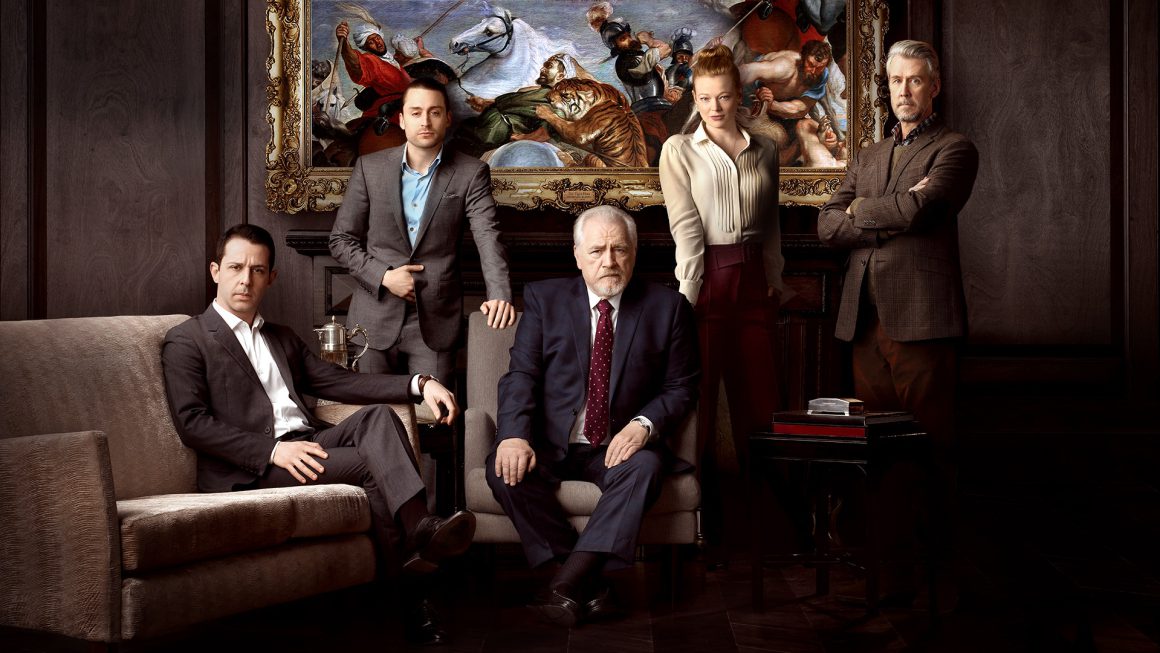By Grace Fors, Socialist Alternative (our sister organisation in the United States)
This review contains spoilers.
In an era of unfathomable inequality and global crisis giving way to rising class consciousness and unrest, it’s no surprise that shows like The White Lotus, Squid Game, and Succession are exploding in popularity.
HBO’s Succession centers on Waystar Royco, a fictional multimedia conglomerate spanning four continents and 50 countries with divisions including entertainment, news, and resorts. Logan Roy is a towering, vicious figure who wields enormous power as the company’s CEO, but he is nonetheless facing the reality of his declining health. His children – the right-hand man and heir apparent Kendall, cynical girlboss Shiv, sadistic wild child Roman, and superficial dabbler Connor – compete to inherit his power and wealth as the head of the company.
This setup is great fodder for drama and morbid humor. But beneath the surface, the world of Succession contains important, yet alarming, insights into our own world under capitalism.
Succession in real life
The show is said to be loosely based on the Murdochs, another corporate dynasty. The Murdochs rule a right-wing media empire that includes Fox News, the clear inspiration for Waystar’s news division, ATN. As one article points out, however, the Roys with all their private planes, yachts, and mansions are probably still not as rich as the Murdochs.
Many of the parallels to real life in the show have great entertainment value. Connor’s outlandish vanity run for president is reminiscent of Mike Bloomberg’s 2020 aspirations. The snafu over ATN’s legal ability to use the slogan “We’re Listening,” when their home devices in fact have surveillance capabilities, is quality comedic relief. But these things really happen. When Waystar acquires punchy media startup Vaulter, they soon gut the operation, firing virtually every employee and giving them fifteen minutes to leave. This happens just as Vaulter’s workers are considering forming a union. The thousands of workers laid off following buyouts at digital media outlets like Buzzfeed and Vice News would not miss the similarities, nor would all those who watched billionaire Peter Thiel’s infamous demolition of Gawker.
Early in the series, we learn of a scandal involving the company’s cruise division. Decades of systematic sexual abuse, exploitation of migrant workers, deaths covered up, and millions of dollars paid out to silence victims are finally coming back to haunt Waystar. While the ensuing federal investigation is disastrous for the characters, the events themselves are hardly out of the ordinary.
Look at the years-long sex trafficking ring run by billionaire financier Jeffrey Epstein, whose circle included such powerful figures as Donald Trump, Bill Clinton, and Prince Andrew. The #MeToo movement exposed just how long sexual misconduct can persist in the workplace, and how the system allows the rich and powerful to get away with it. The public learned of extensive, checkered histories of cover-ups and retaliation not only on behalf of powerful individuals like Harvey Weinstein and Bill Cosby, but companies like Activision and Google. Sexual harassment and abuse run rampant in the service and hospitality sectors, and migrant workers and the undocumented experience sexual abuse, injury, and death with heightened severity and scant resources.
One particular event in the first season bears a chilling resemblance to the Chappaquiddick scandal of 1969, in which 28-year-old Mary Jo Kopechne drowned after being driven off a bridge by a reckless driver. The driver of the vehicle did not face charges – because he was Ted Kennedy.
In reality, rich people get away with murder every day. When a worker collapsed on the job at a Frito-Lay plant and later died, their coworkers were asked “to move the body and put in another co-worker to keep the line going.” Only weeks ago, six workers were killed when a tornado blasted through an Amazon warehouse they were trapped in. This is to say nothing of the millions and millions of workers who die of low wages and poverty, climate disaster, and lack of healthcare – all of which constitute deaths at the hands of capitalism.
While the show is fictional, its dialogue will refer to real people like Mark Zuckerberg and Jeff Bezos as if they’re people the characters know and rub shoulders with. This highlights how Succession does not really intend to present an alternate reality; its story is intertwined with the prevailing social order.
In Succession’s world, everybody sucks
In a profile for the New Yorker, showrunner Jesse Armstrong paraphrases a quote from Marx’s Eighteenth Brumaire of Luis Bonaparte. The actual quote: “Men make their own history, but they do not make it as they please; they do not make it under self-selected circumstances, but under circumstances existing already, given and transmitted from the past.”
It is interesting that the show’s creator would put forward this reference. Many viewers of Succession complain there are “no likable characters” among this mob of wealthy elites, and they’re not wrong. However, from a Marxist perspective, this is one of the show’s key insights. In his Theses on Feuerbach, Marx argues that “…the human essence is no abstraction inherent in each single individual. In reality, it is the ensemble of the social relations.”
Throughout the course of the show, we see Logan Roy hit his children and grandchildren, taunt his sons with homophobic slurs, spew sexist rhetoric, cover up manslaughter, and urinate in his son’s office out of spite. Everyone around him walks on eggshells in fear of being the target of one of his profane, angry outbursts. But everything Logan does is enabled by capitalist society. Private ownership of the means of production means the boss dictates the workplace. The patriarchal family system preserved and reinforced by capitalism keeps his children, whose inheritance is in Waystar stock, trapped within this dictatorship. Even political figures as powerful as the fictional President must stay in his good graces or risk being smeared on Waystar’s news channels, just one example of how establishment politicians are structurally beholden to the goal of keeping the capitalists happy.
Brian Cox, who plays Logan, compared his character to Andrew Carnegie when he told the Financial Times, “This kid who had nothing, transported to Pittsburgh from Dunfermline at the age of 12. He became the richest man in the world. But at the same time, he also became this demonic creature.”
In the day-to-day life of a billionaire, CEO, and patriarch like Logan Roy, there is simply no necessity for the basic social skills that are second nature to working-class people – traits like cooperation, compromise, and empathy. Working people need these skills in order to survive. However, with complete dictatorial authority in every area of life, and virtually no accountability, it seems only natural that a person’s character would become distorted into one like Logan Roy’s. The likes of Bezos, Musk, and Zuckerberg may not subject their subordinates to such demeaning games as Boar on the Floor – as far as we know – but they could if they wanted to, and who would stand up to them? The only people with any semblance of power over Logan are Waystar’s shareholders.
In his eighth thesis on Feuerbach, Marx argues, “All social life is essentially practical.” For all his wickedness, Logan fundamentally behaves in the interest of his own wealth and profits. His skill at pitting people against one another, blackmailing them into submission, and using carrot-and-stick strategies to get them to do what he wants are all tools that help maintain his iron grip on the company. And while Logan is by far the worst, no one is immune. Characters like Tom and Greg, who weren’t born into this status, nevertheless must learn to become manipulative and ruthlessly self-interested in order to get by in the upper management ecosystem. We get indications that these characters can feel guilt and shame, but it makes little difference in what’s required of them to get ahead. As Logan says, “you have to be a killer.”
In Waystar’s shadow logs, certain cases involving migrant workers, sex workers and others who faced horrific mistreatment in the cruise division are marked “NRPI.” This stands for “no real person involved,” a striking illustration of how untouchable socioeconomic status distorts human nature to an extreme degree. This is no fable, but a fairly well-researched phenomenon in studies of the impact of social class on compassion and empathy.
Kendall Roy’s “Woke” rebrand
Many of the show’s plot points involve Kendall’s on-again, off-again rivalry with his father. This rivalry is part familial drama, and part conflicting corporate strategy as Kendall’s desire for Waystar to acquire tech, data, and “forward-thinking” arenas for profit challenges Logan’s monopolistic desire to bulk-buy local news.
In Season 3, this takes a particular “woke-capitalist” turn. Suddenly in the wake of the cruise scandal becoming public, Kendall declares “Time’s Up.” In the media and in his appeals to get his siblings on his side, he passionately condemns WayStar’s record of rampant discrimination and its culture of sexual exploitation. However, this pivot is not the result of Kendall educating himself on the roots of oppression – it is quite plainly to save himself from being scapegoated for the crimes. This is a page ripped out of the “woke capitalist” playbook, and Kendall’s plot arc in Season 3 is only a microcosm of a much broader and more dangerous trend.
We have written about the pernicious rise of “woke capitalism,” where a growing number of corporations and sections of the political establishment are “attempting to present themselves as leading voices in the fight against racism, sexism and oppression.” In the context of increasing radicalization and a desire to fight back against oppression evidenced by #MeToo and the George Floyd uprising, corporations have taken steps to cloak themselves in social justice phraseology for marketing purposes and, crucially, to absolve themselves of their role in reinforcing oppression, inequality, and exploitation. While Kendall’s social justice crusade is played very blatantly in the show as shallow and hiding his real aims, woke capitalism more broadly is just as much. Both will ultimately fail to present any real threat to the systemic oppression they claim to oppose. They’re the problem!
Shiv Roy: “Girlboss” feminism and the corrupt two-party system
At the start of the series, Shiv Roy is a political strategist working with the Democratic Party. Despite her ties to her father’s right-wing corporate empire, she takes a job on Gil Eavis’ campaign for the Democratic presidential nomination. Gil is presented as a cynical version of Bernie Sanders, a left politician inside the Democratic Party.
GIL EAVIS: One section of my base would be outraged for me even meeting with you.SHIV ROY: Yeah well that section has nowhere to go.
While on the one hand, Gil is a political threat to Logan via his role in the federal investigation into Waystar, he nevertheless makes opportunistic concessions, brokered by Shiv, to the detriment of the working-class base he claims to fight for. Since this episode came out, we saw Bernie Sanders shamefully concede the Democratic primary to Biden, while the now-expanded Squad has put up virtually no fight against the countless disastrous failures of the Biden administration. These betrayals are part and parcel of the strategy of using backroom negotiations and establishment horse-trading, a strategy fundamentally incompatible with maintaining accountability to the working-class movement.
In Season 3, the family attends the Future Freedom Summit, a right-wing political fundraiser where conservative mega-donors choose the next Republican candidate for the upcoming presidential race. The family debates who the Roys, with their arsenal of campaign dollars and control of major news sources, should throw their weight behind. With the cruise scandal under investigation, deciding who would be most likely to let Waystar off the hook is a high-stakes decision for the family. Roman characteristically backs the far-right populist provocateur as the most likely to arouse a fervent base and win the presidency. Shiv objects and suggests the family go with the Democrats because “the Dems will run on change.” (Of course, she also says she’d settle for the establishment Republican who promised to help her become Wayster’s next CEO.) She argues quite explicitly that they will make promises to working people yet ultimately keep the family’s interests safe.
Shiv is right – this is exactly what we have seen in Biden’s presidency, and Obama’s “Hope and Change” campaign before him. The Democrats will make massive promises to working people, only to fail spectacularly by standing firm with corporate interests. Shiv is also right that, unfortunately, the left at this stage has nowhere to go. This is all the more reason we can’t let it stay that way, and it is precisely why working people and the left urgently need to break free of the vicious cycle of two-party volleying, and instead must build a new political party of our own.
Shiv is a prototypical “girlboss feminist.” Her audacious personality stems from her belief that as an outsider and a woman, she offers some sort of fresh approach and can “change the system from the inside.” In Season 2, she tampers with a witness who was planning to testify before Congress about the abuse she suffered at the hands of the cruise division. Shiv tells the woman, “Normal people, they will doubt you. They’ll say terrible things. They’ll call you a slut, a whore, and a money-grubber. Your life is going to be ripped apart.”
A year before the episode aired, the world had watched as just that had happened to Christine Blasey Ford in her testimony against Brett Kavanaugh, and her rapist was ultimately appointed to the Supreme Court. At that time, establishment Democrats like Nancy Pelosi spoke strongly in support of Ford and of “believing survivors.” Then two years later, when former staffer Tara Reade came forward with credible allegations of sexual assault by Joe Biden, only to be met with stubborn denial and attacks, figures like Pelosi were “satisfied with how he has responded.” The liberal wing of the ruling class will readily weaponize the fight against sexism, assault, and abuse when it suits their interests, then callously dispose of it when it is no longer convenient.
Wait, these are the kind of people who run society?
CONNOR ROY: This family’s broken, and that has consequences. A missed phone call today, a couple dozen kids lose their jobs in China.
For all the power they hold over politics, mass media, and the likely thousands of workers they employ, nobody in this show contributes anything to the world. No value is created in executive boardroom meetings, at fancy dinners, or while boar hunting in Hungary. The show is driven by a dynamic struggle over who should run Waystar Royco, but the fact is that none of them should.
Ordinary working people seldom make appearances. Typically, they are passive actors there to absorb the consequences of the main characters’ behaviors and illustrate their flaws. But this is a lie by omission. Logan, as formidable as he seems in the show, would be nothing and nobody without the thousands of workers who actually create the profits he worships.
In real life, working people are starting to realize this. From the unsuccessful yet trailblazing effort to unionize Amazon warehouse workers in Bessemer, to the ongoing unionization wave at Starbucks, to the numerous strikes of 2021, it is becoming clearer that working-class organization and action is the key to taking the reins from corrupt capitalists. A revolt of unionized Waystar workers, paired with a political movement for democratic public ownership of the top corporations, would be the only way to take down a figure like Logan Roy without replacing him with another Roy-Like monster.
In Succession and in real life, corporations and the rich are responsible for widespread abuse and exploitation, the rise of reactionary right-wing ideas, climate crisis, spiraling inequality, and societal dysfunction on a global scale. The capitalist ruling class can wear many faces and struggle for power amongst themselves within the walls of the boardrooms, but the future will be decided not by them – it will be decided by the millions of people outside.












